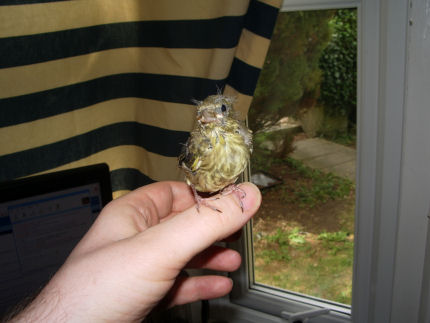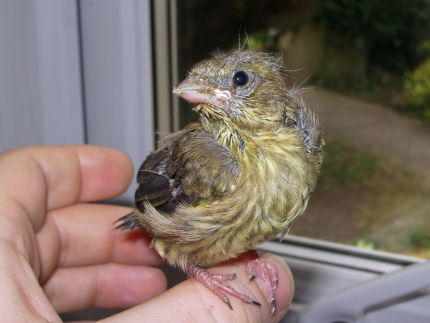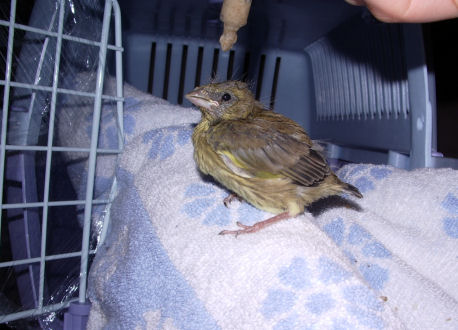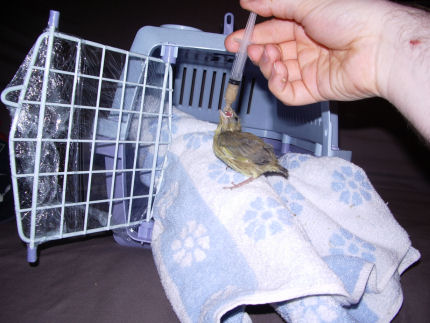Author Archive
Welcome To Bollywood
by John Walker on Apr.20, 2007, under The Rest
Does anyone know why the BBC News website is so focused on Bollywood?
Today one of the top three biggest stories in the world, on the front page, is apparently a story about two Bollywood actors getting married.
Am I completely out of touch, and Bollywood has become a massive deal in the UK, bigger than Hollywood?
Or is there something more peculiar going on? Does the BBC hugely invest in the Indian film industry?
I don’t care either way, resigned as I am that stories about Madonna adopting Angelina will be considered important enough to reach the front page, and so it might as well do the same for any film industry of any country. But the Bollywood theme is recurring, while French, Australian, Italian etc industries are all but ignored, and I’m intrigued to know why.
Television: Thank God You’re Here – NBC
by John Walker on Apr.19, 2007, under Television
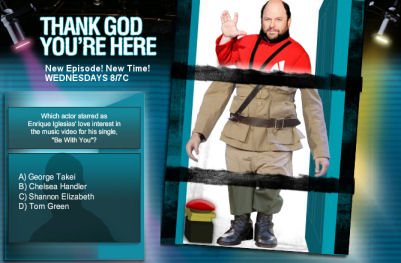
Televised improv has only ever worked once. And then, it only worked a bit. Whose Line Is It Anyway is an interesting creature, beginning on Radio 4 as a faux intellectual nonsense, then transfering to Channel 4 with the same crew – Stephen Fry, John Sessions, etc, before wading through Tony Slattery and Sandy Toskvig and then finding its best fit with a near all-American cast. It was then natural for a US network to pick it up and start making it for themselves. However, it couldn’t go that smoothly, and naturally changes were made. Clive Anderson’s falsely befuddled nature, and quick-witted cruelty provided an excellent straight man for the hyperactive silliness on stage. Drew Carey’s desperation to be involved created a constant tension, peaking when he leapt from behind his desk to shout along with the rest. But worse, far worse, was the programme’s desperation for you to know that it wasn’t scripted. Yes – we know – it would be a lot funnier if it were.
It’s as if improvisation is some sort of mystical paranormal ability that the audience is deeply skeptical about. “They couldn’t possibly have made two words rhyme if they hadn’t had a team of writers working on it for weeks! This must be FAKE!”
Thank God You’re Here is an Australian import that NBC has no idea how to handle. It’s a simple improv game – take an actor or comedian, put them in a costume, and have them walk through a door into a scene they know nothing about. They have to cope with whatever the cast do or say until the klaxon sounds. It’s a good concept, and there’s no reason it shouldn’t work. Were it not for the desperation to boast that they have “no idea, you’ve no idea, no idea at all…” about what’s going to happen. Constant declarations of how “dangerous” it is, how it’s “an actor’s greatest fear”. As if not knowing what was going to happen next, or what everyone else was going to say, weren’t how real life works. The real pressure, the real fear for those participating, is to be funny.
This needy nature spreads to host Dave Allen Grier, who if given free reign can be fantastically funny. It’s the good old irony of having an excellent improviser constricted by trying to remember his awkward lines. Trying so hard to create an atmosphere of tightrope walking over rabid sharks, Grier generates an all-permeating insincerity that drags the potential of the show down with it. Co-hosting, and psuedo-judging the performances, is the lovely, cuddly Dave Foley. Far better, he cracks wise after each sketch, but then says that everyone was “hilarious”.
The show finishes with all four in one scene, which until the third episode was a completely unfunny disaster, suddenly made hilarious by the complete descent into crazed kissing leaving DAG clueless about what to do. Which is not a criticism, really. He can’t have been expecting Shannon Elizabeth to start smooching one of the regular male cast, only to be upstaged by George Takei doing the same, then upstaged once more by Dave Foley leaping from behind his desk, rushing the stage and kissing the man while Elizabeth began snogging Tom Green, and then eventually poor, confused DAG. (Shannon Elizabeth then realised her mistake and kissed Foley, remembering he was the judge).
Er, so impromptu orgies aside, it’s as hit and miss as improv always will be, and only enjoyable if you can swab the treacle of gushing bravado from your mind and enjoy each sketch alone. It’s interesting who copes well. The choice of guests has been intelligent so far, picking people with a decent background in either comedy or improv. Both Jennifer Coolidge and Jane Lynch from Christopher Guest’s improv film troop have appeared, as well as Jason Alexander, Brian Posehn, and Tom Green. However, oddly, none of them did particularly well. Coolidge resorted to her Best In Show character when asked to be a beauty queen, and copped out of most moments for genuine improvisation (but for one exellent moment – when asked what she would like to eradicate from Earth, she replied immediately, “dry ice”). Lynch was given a poor scenario, as a teenager rumbled for having a party by her parents. Posehn couldn’t cope at all, and it’s a real surprise they left his scenes in the show, with him standing still looking terrified, then giggling. Green and Alexander were both fine, but each resorted to type, Green shouting and climbing the sets, Alexander crowbarring in a reference to Seinfeld.
Far, far better, and perhaps unpredictably, were Bryan Cranston, Wayne Knight, Chelsea Handler, and Joel McHale. Knight was surprisingly quick, and constantly funny. Chelsea Handler was almost too confident, slick and rude, scaring the regular cast. McHale, who seems genetically designed to be hated, was really very funny as an Egyptologist, and controlled his scene impressively. But best so far has been Bryan Cranston (which is a bit of a shame, as he was the first to go in the first episode), who shedded any Malcom In The Middleness he might still have, and was absolutely hilarious. And not just because he too smooched every member of the cast.
So you end up with a hit to miss ratio unfortunately balanced the wrong way. When it hits, it’s great, but the rest of the time it’s flaying awkwardly, especially without the support of a confident host. (Which makes no sense – DAG on anyone else’s programme will take over completely, dominating normally to humourous ends). Bumpering the sketches are a couple of pre-taped scenes which are used to “warm up” the contestants the previous day. These are edited together well, each of the four taking part in the same scenario, one after the other, the funniest moments cut together to create a single run through of the scene, jumping between each actor’s take. This trims the lack of laughs out completely, and so far all six of these have been very funny. They, bizarrely, are the model for how television improv should be produced, but instead are used as throwaway moments between the over-hyped and less funny live sketches.
Preview: Hour of Victory
by John Walker on Apr.19, 2007, under The Rest
Comments Off on Preview: Hour of Victory more...Television: This American Life – Showtime
by John Walker on Apr.19, 2007, under Television
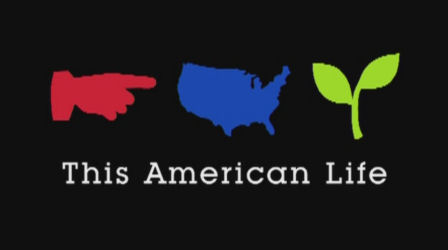
I almost don’t have the words.
I feel like if I write this badly, I’ll break it. Like I might break the spell, and it won’t exist any more.
This American Life has been a radio programme broadcast on Chicago Public Radio, and syndicated on public radio stations across America, for a decade. You can hear it here. Each week, as presenter Ira Glass would say, they choose a theme, and bring a variety of stories on that theme. It’s about the intricate details of people’s lives, the specifics that make them them, rather than you. It’s almost unique in not trying to identify with its listeners, but rather simply asks you to be interested in someone else.
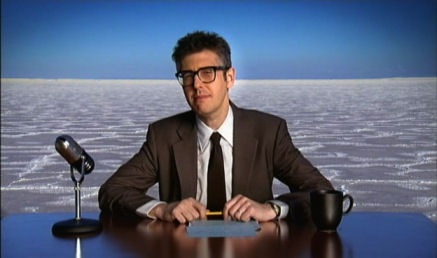
A British reference point would be Home Truths, presented by the late, and missed, John Peel. Both programmes shared a gentleness that’s almost impossible to find anywhere else. And neither did this at the expense of honesty. Difficult, painful stories are as at home as amusing or uplifting tales. John Peel died, and, eventually, Radio 4 gave the programme the dignity to let it die with him. Fortunately Ira Glass is alive and well, and so This American Life continues.
Taking radio to television is a process that requires grace and intelligence. Or more often, reinvention. This American Life opts for the first option in an unparalleled fashion. It is radio with pictures. Really beautiful pictures.

Mimicking the radio programme’s format, an episode begins with a short interview or report, and then an introduction from Glass declaring the loose theme for that edition. On the television programme, he sits at a simple wooden desk with a microphone, perhaps on the side of a mountain, in the middle of the desert, or in an underground carpark. The Python reference seems quite deliberate, but simultaneously explains Glass’s role in the proceedings – a man separate from the events.
Perhaps a great testament to the programme is that it took me four episodes to realise that it was only half an hour long. The deliberate and composed pace provides so much precise detail that it feels as though it must be closer to an hour. To fit in three stories, each leaving you feeling intimate with the subjects, in such a short time is astonishing.
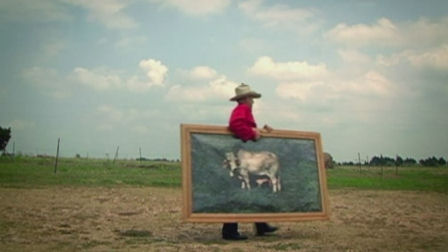
So far televised stories have included the farmer whose tame pet bull, Chance (so tame that it became a novelty, appearing on Letterman and the Superbowl half-time show), was dying, and was cloned as part of a Texas university research project. Or the 14 year old junior high student who has rationalised the futility of love, and sworn to never succumb to its “barbarian” ways. There was the politician who never lies, and the man who seeks bearded men in Utah to pose for photographs for his paintings of Biblical scenes. There was the photographer who stood and photographed while a woman was swept out to sea and drowned. Last week’s stunning edition dedicated an entire episode to the documentary a man in his twenties has made about his alcoholic parents, one a former pop star and now step-dad, the other his broken and conflicted mother.
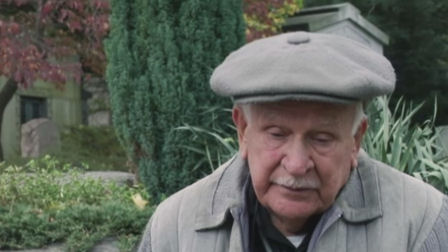
What makes it so special is the respect with which the subjects are treated. It’s not naive or unquestioning, but rather documentary that asks the questions that are relevant, but knows when to be quiet and listen. Talking to Joe, the 14 year old who has sworn off love, TAL demonstrates a degree of respect that I have never seen television show a teenager. It doesn’t patronise him, or suggest that he doesn’t know what he’s talking about. It shows his mother, Naomi, exasperated that she thinks he doesn’t know what he’s talking about. But it gives Joe a place to explain his thinking. When people are in ridiculous situations, Glass asks astonished questions. It’s an honest reaction, and it brings out more truth from the subject.
And the pictures. Perhaps driven by the fear of translating something they love to a medium they know is capable of brutally destroying radio, every shot is so beautifully constructed. The colour, the contrast, the juxtaposition, all breathtaking. You could pause it almost anywhere, print it out, and frame it. Ingeniously, the editing is frequently such that a person begins speaking long before you see them on screen. This degree of separation maintains the atmosphere of radio, where your imagination is still given room for creating images, despite those already present on screen.
Add in the superb music selection, and Ira Glass’s wonderful voice.
It’s deeply emotional, deeply intimate. It’s never naive, but prepared to listen. It maintains the profundity of the radio series, but is deservedly executed on a different medium. This is how good television can be.
Birdie Update
by John Walker on Apr.17, 2007, under Photos
It survived the night.
Well, that’s selling it rather short.
It recovered overnight.
I got up at 5.30am to do another feed, and it was spritely and enthusiastic. Then again at 9am. And then one last time before the Nice Lady came at 12pm. The last feed was the most exciting, demanded by the first signs of cheeping (since the screams – oh, the screams). Then there was hopping all around my room, and finally, sitting on my thumb.
The Nice Lady assured me that they have a habit of becoming tame very quickly, and then just as quickly becoming “untame” again. They will look after it in its own cage before transfering it to the aviary until it can fly, and then release it into the wild for another cat to eat. More pics.
Television: Drive – Fox
by John Walker on Apr.17, 2007, under Television

The first episode of Firefly ensured one thing: You were going to watch every other episode in the series, even if you had to kill close relatives. The first episode of Drive ensures, well, nothing.
Sharing a writer, Tim Minear was responsible for some of Firefly’s greatest episodes, with perhaps even a mature edge over Whedon’s wonderful dialogue. And so, sometimes a show gets measured from zero expectations upward, and other times from high expectations downward. It’s his own fault for having been so good. He’s not this time out.
It’s not bad, however. The idiotic concept is thus: there’s a secret, illegal road race across America, in which some participants take part willingly, while others are forced into the game to save kidnapped loved ones. They must solve clues and race to locations, desperately trying to not come last. So, er, a bit like The Amazing Race then, but pretend.
The Amazing Race is one of my naughty treats. 11 teams of two INARACEAROUNDTHEWORLD. It’s excellent nonsense television, as pairs of dimbos all fight at airports to get better flights, then shout at the confused locals in various countries, trying to find a clue box and then complete the appropriate challenge. As a Big Concept show, it’s fantastically executed, exec produced by Jerry Bruckheimer, and overblown to match. It also features the best creator/producer name of all time: Bertram Van Munster. Yes, it’s reality TV (or “unscripted TV” as the Americans attempt to sell it), and yes it’s populated mostly by morons, but the sheer scale of the project (now in its 11th season) is just so immense that it gets away with it.
Drive’s not that immense. Poor old Drive. Death by comparison. Again, it’s not that bad. It’s just not good. You’re given a huge cast of thinly sketched characters and asked to care about them from the very start. But why? When someone comes last, and is therefore charged with killing another character, you don’t care about the consequences for her, and you certainly don’t care about her victim. There’s the father/daughter team with Minear’s attempt to write a Whedon teenager and missing really quite embarrassingly badly. There’s three girls who after starring in two episodes are still completely anonymous, but the show’s website informs us they were brought together by Hurricaine Katrina – eurgh. There’s, um, oh blimey, there has to be… No, I forget. And finally there’s Cap’n Mal, Nathon Fillion. He’s the only character there’s been any attempt to flesh out, his wife kidnapped and his participation in the race an unwilling one. But Minear’s choice to use former Firefly colleague might have been a bit of a mistake.
Fillion is perfect in Firefly. His cowboy behaviour, dubious morality and quick temper (and trigger finger) make him by far the most interesting captain of any spaceship. Smart, loyal, and a master thief, Fillion nails it. In Drive he’s given almost nothing to do but complain, and then presumably because Minear is confusing the unwitting victim and loyal husband with his former gunslinging character, he then suddenly displays the ability to kidnap and interrogate people. Er. Perhaps we’re supposed to believe that his wife’s predicament will drive him to do anything to save her. But instead you get this jumble of a character who is, so far, rather disturbingly unlikeable.
American TV has a rather bad relationship with filming driving. With cars normally hooked on the back of camera trucks, the actor has no reason to look at the road in front, and so in response, doesn’t. It’s so hard to concentrate on what’s being said, rather internally screaming, “LOOK AT THE ROAD! YOU’RE GOING TO DIE!” Programmes like Homicide have rather cleverly gotten around this by, well, having the actor be driving. And it’s madness that more shows aren’t doing this. Drive has created some rather fabulous CGI techniques that allow the camera to drift between cars on the same road, and fade seamlessly through windows. It looks awesome. It also means all the driving is shot on green screen, and so we’re in the worst territory of all for eyes-right driving fu. You’d think a programme about driving, y’know, called “Drive”, would work a bit harder to have the drivers act like they’re, what was it again, ah yes, driving.
So episode three is about now, and I think I’m going to watch it. But I’m not sure why. Perhaps loyalty to Minear, since I know he can write excellent dialogue, even if he hasn’t written a decent line in the first two episodes. I think he gets one more go.
My Ludicrous Life
by John Walker on Apr.17, 2007, under The Rest
Today I have been a mummy bird.
This morning, rather unpleasantly, Dexter brought in a finch chick.
I came in after hearing the screams, saw it sprawling on its back and feared the worst, imploring Dex to just kill it and get it over with. (Why a photo? Craig suggested I take one, so I did). Dex I think was just as surprised by it all as me, and just aimlessly batted at it with his paw, wondering why it was being a less entertaining play companion all of a sudden.
Dragging the cat off it, and informing him that he was a “VERY BAD CAT”, I scooped up the bird into an empty tissue box, and began the awkward thinking on how I was going to kill the poor thing. Getting it up the right way, however, seemed to suggest that there had been very little harm done. Dex still only has his baby teeth, and appeared to carry it in very gently. But I figured, it’s a very young bird despite having fledged, and it’s pretty much going to die whichever option I pick.
My pussy way out was going to be to take it down to the allotments near my house and let nature’s winner eat it for dinner. I’m quite pragmatic about this sort of thing, and have no problem with cute baby anythings getting eaten by hungry grown up anything elses. But then speaking with my bird-loving mum, she suggested that I ring the vet and see if they have a contact. They did, and after a series of phonecalls, I spoke to a lady who apparently rescues birds like this all the time. What an excellent lady. She said I should drip water on top of its beak, which it would then hopefully take in as it flowed down, and that she’d ring me back later to let me know when she could come over.
The water dripping worked, and in fact Birdie began opening its mouth at me like a chick in a cartoon. Gaping, I learned this is called. When the lady phoned back to let me know she wouldn’t be able to come until tomorrow morning, we agreed it unlikely that it live that long, but she was pleased to hear about the gaping. She said, “If it’s opening its mouth, you should probably put something in it.” And after a run-down of the cereal in the house, she suggested mashing up some Wheetabix with warm water, and seeing if he’d eat that.
After some experiments with a syringe and teaspoon and a lot of spilt Wheetabix, I noticed that the gaping started whenever my finger went near. It was worth a shot. I loaded my little finger up with goo, and went toward the beak which was suddenly flung open. Lots of nipping at my fingers later and a decent amount seemed to have gone down.
Later in the evening, and all looked lost. It was keeping its eyes shut, and refusing to swallow the water drips. Ready to just leave it to quietly die in the cat box (temporarily its home), I then spotted some sneaky swallowing out of the corner of my eye. A few more drips, and we were back in action, and then eating Wheetabix again.
I’ve now mastered the art. Filling the syringe with the mushy Bix, but teasing the beak open with my little finger, then squirting it gently in. Gobble gobble gobble, more please.
So we shall see if it lasts the night. I should be passing it on around 9am if it lives, and so think I’ll give it one more feed at about 4am. Which means I’m now dedicating ridiculous energy to an animal I was quite happy to feed to the foxes. I’ve realised after three feeds that I’m now going to be sad if it does die, which is annoying.
Television: Painkiller Jane – Sci Fi Channel
by John Walker on Apr.16, 2007, under Television

I think people are going to somewhat miss the point of Painkiller Jane. There’s a simple trick to understanding it: Read the title.
Read it again.
One more time.
Ok, so now perhaps we can forget our worries about its not being Dostoyevsky and enjoy a bunch of nonsense that is enjoying being such? Episode 1 of anything science fiction always has a hard time – introduce the cast, then the special nature of that cast, then have them face a typical scenario, and then introduce a twist. It’s a lot to do in 43 minutes. And so while PJ has some awful moments of awkward exposition, and while it has a couple of, “Oh no, please don’t say… Oh! You said it!” scenes, it does a fine job of being daft scifi about super-elite cops fighting against the Neuros – genetically enhanced humans with paranormal abilities.
Most impressive is the use of colour. I’m sure ten thousand TV blogs are currently writing, “…looks like a music video…” and tsking loudly, as if this is inherently a bad thing. It’s the laziest of dismissals for any form of innovative filming, and, you know what? Sometimes music videos look really fantastic, and it can be a good thing to look like one. PJ’s use of colour is really very impressive, with the shades washing away subtly throughout scenes, sometimes leaving things entirely in black and white, other times letting colour bleed back in at dramatic moments. It’s a really nice technique, and makes a pleasant enough show keep your attention throughout. Plus it stars the T-X terminator.
Television: Doctor Who – BBC 1
by John Walker on Apr.16, 2007, under Television
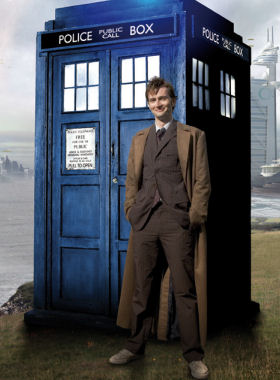
Please, someone, take charge.
Despite a decent opener, and a surprisingly unhateful performance from Mr Who’s new assistant, Martha, it’s more clear than ever before that a reasonably entertaining family sci-fi could be something really special. If only someone other than Russell T Davis were in charge. I’ve no objection to his working in the background, and I’m pleased that he’s made a nice idea viable once more, but he is a very bad science fiction writer, and someone needs to be involved who can say so.
For two partially enjoyable series, he’s screwed up the arc appallingly twice. Series 1 teased us with “Bad Wolf” references scattered through the universe, suggesting that something magnificent was coming. It wasn’t, and the final result of a grumpy TARDIS (American readers, sorry) seemed like it had been cobbled together at the last minute, rather than some clever meta-theme reaching its zenith. Series 2 was even more dismal, despite having a really wonderful final moment. As much as everyone enjoyed watching the Daleks and Cybermen hitting each other with their handbags, it was a really dreadful load of crap, only fondly remembered thanks to the remarkably emotional and effective scenes seeing Rose and the Doctor separated irreparably.
Series 3 is shot from the opening moment, unless he’s doing something cleverer than he’s ever demonstrated the capability for. Dropping hints that he’d feature The Master soon, and then throwing around references to “Vote Saxon” and people discussing that a new leader is on the way, isn’t exactly subtle. If it’s intended as a big reveal, then perhaps it shouldn’t be available as an episode summary on any listings site. If he’s a better plan in mind, deliberately playing off people’s expectations, then I’ll be delighted to be wrong, and remarkably surprised.
Meanwhile, episode 1 did a surprisingly decent job of introducing Martha, without it turning into Eastenders again. And thank God she doesn’t have a moronic boyfriend to drag every other episode into the lowest depths of chav TV. Transporting a hospital to the moon was a satisfyingly idiotic idea, and RTD inevitably couldn’t write an ending and it all became nonsensical farce, but for a while there it was onto something.
Episode 2’s trip to see Shakespeare was about as loathsome as the programme could imaginably get. Even RTD couldn’t come up with a script so abysmal, instead having to turn to a writer for, er, Brookside. Gareth Roberts has clearly never seen anything of Shakespeare beyond Shakespeare In Love, as he proved by embarrassingly misunderstanding anything that made Shakespeare of interest, instead believing the power of the plays to be in his flowerly language. Endless references to the Bard’s being “the greatest genius of all time” were tiresome drivel, and worst of all, spouted by the character with an understanding of science, and perhaps therefore a decent grasp of slightly more productive geniuses out there. And no, this isn’t some Shakespeare snobbery – I’m barely more literate on the subject that Roberts’ primary school grasp, but that’s one of the primary reasons why I wouldn’t write a television programme about him. And then comparing the works of Shakespeare to that of talentless hack JK Rowling was the last straw, leaving me screaming enraged at my monitor. (Goddammit, even if you’re one of these cheese-faced buffoons who think Harry Potter is “lots of fun”, you surely wouldn’t be so repulsive as to compare her sub-literate prose with that of Shakespeare?) Seeing that the Doctor was to meet the Bard, I sighed predicting that we’d have to sit through the ordeal of the Doctor saying Shakespearean quotes to Shakespeare, who would reply, “That’s good – I could use that.” I never, even in this pessimistic funk, thought that they’d do it FIVE BLOODY TIMES. Burn everyone involved.
Episode 3 was back to RTD’s usual fare: having a good idea, but then not knowing what to do with it. So he wanted to satirise the traffic jam nature of modernity, and create a literal traffic jam with no destination, and all involved oblivious to their reality. But then he decided to fill it with wacky characters, and spend over half the episode watching people aimlessly chat inside hovering car sets worse than something Red Dwarf would have hammered together. It took a Doctor Who stalwart – a mysterious giant monster hidden at the bottom – and then completely removed any notion of terror by hiding it for far too long, and then revealing them with no ceremony. The man has no idea how to write monsters, and it would be nice if he stopped trying. This is the guy who had a Dalek explode over pondering the emotion of love. Gah. Nice to hear what the Face of Bo had to say, but sadly it only seems to point further in the direction of a Saxon anticlimax.
The future looks mixed. Next is a two-parter written by one of the script editors, which bearing in mind the results of her work so far, doesn’t bode well. Then it’s someone who wrote for The Bill. Then, dear God, a producer and writer from Torchwood. Then, after those weeks of worry, Paul Cornell (who wrote the wonderfully moving series 1 episode, Father’s Day) is back with a two-parter. And then, immediately it’s Stephen Moffat’s episode, Blink. So far he’s written the three best episodes – The Empty Child and The Doctor Dances from series 1, and best of all, series 2’s The Girl In The Fireplace. Then it finishes with three in a row from RTD. Sigh. Please, get him off the scripts, someone. Get Moffat in charge! Is anyone producing this programme? Anyone?
Television: The Shield – FX
by John Walker on Apr.15, 2007, under Television

Hooray! It’s back! I’ve watched the first two, and am saving the mysteriously appearing third episode for a rainy moment. Following on immediately from the rather stunning climax of season 5’s back-n-forth between Chiklis’ Vic Mackay and Forest Whitaker’s Jon Kavanaugh, it’s maintaining that breath-stealing frenzy of intense wrongness, as everyone growls at everyone else, sometimes without pissing on them and/or setting them on fire.
The Shield has always straddled the peculiar ravine between ludicrously daft and intensely traumatic. Perhaps it’s the ridiculous limitations of semi-deep-cable channel FX, where they can say “shit” but not “fuck”, show a bare bottom but never a nipple. The impression that the writers are constantly trying to see how far they can go within such arbitrary and nonsensical restrictions gives it the feeling of their being a naughty boy constantly testing parental lines. And there’s the idiotic, hilarious phrases like, “I’m going to shit you up.” But fortunately, it’s probably this property that keeps it watchable, rather than leaving you having to seek counselling for the constant emotional brutality.
There was an interesting debate on some forum recently about whether The Shield is racist. It was pointed out that the cops spend a lot more time punching and kicking black and Hispanic criminals than they do for the whiteys. It was also observed that the all-white Strike Team (but for the unfortunate black cop who joined briefly, before meeting his inevitable way out) was constantly helping all those pesky non-white gang members to run their drug operations, which they’d all mess up if left to their own barbaric devices.
I think the second point does stand. The assumption that all the crims are thick is too easily written in. Even the stand-out exception, uber-baddy Antwon Mitchell, was eventually bested by Mackay’s shiny white head. I don’t believe this is malicious writing – perhaps just a bit stupid. The first point, however, simply misses the entire point of The Shield: There are no good guys.
The Strike Team are the baddies. It’s no more complicated than that. It’s not exactly subtle, either. Knocking over the Armenian money train, the initial murder of a cop, and Vic’s additional income from godfathering the district’s drug barrens don’t exactly suggest white hats. The cleverness of the programme is to ensure that as a viewer, you find yourself wanting them to win. And that makes you a bad person too. They are racist. They are deserving of immediate imprisonment. And often, they are far worse than the criminals they so horrifically hunt down. So how come the one person who should be stopping them, Kavanaugh, is the one at whom I’m booing? It’s because they write it really well, and they make you like racist bastards. And that’s tough going. Thank goodness they’re not allowed to say “fuck”.
